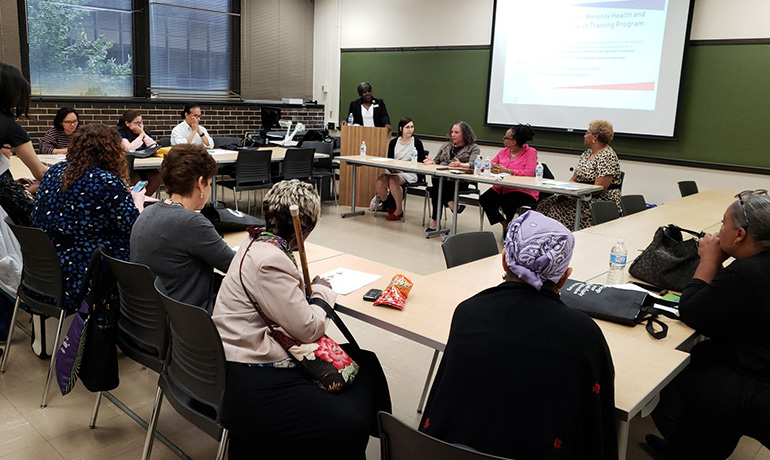
Theresa Mah has closely observed health inequality in her life, and she wants to help balance the scales.
A former resident of Toledo, Ohio, Mah, the Illinois state representative from Chicago’s 2nd District, lived next door to two women who had been diagnosed with cancer. One, a black single working mother, struggled with the disease and eventually died, having had no health insurance to help defray the high cost of treatments. The other neighbor, a white woman whose retired husband had health insurance provided through his union, did not suffer the same fate. She received excellent treatment and survived.
“We live in an inequitable society,” said Mah, who served as keynote speaker at the Fourth Annual ChicagoCHEC (Cancer Health Equity Collaborative) Community Forum held last week at Harry S. Truman College. “What are we to do, and how do we tackle the inequities? It’s not easy but we’re working to do something. The fact that all of you are sitting in this room goes a long way in making a difference. There shouldn’t be barriers. It’s very important work you’re doing.”
About 250 people attended the day-long event, titled “Navigating The Cancer Journey: With Resources For Early Detection To Survivorship.” ChicagoCHEC is a National Cancer Institute comprehensive cancer partnership led by the UIC, the Robert H. Lurie Comprehensive Cancer Center of Northwestern University, and Northeastern Illinois University. Its mission is to advance cancer health equity through meaningful scientific discovery, education, training and community engagement.
The day began with two panel discussions, one examining the importance of location in cancer detection and the role of healthcare providers associated with cancer care, and the second discussing cancer resources and support, from detection to survivorship. UI Cancer Center member Richard Warnecke, PhD, served as moderator for the first session, while UI Cancer Center Patient Brigade member Candace Henley, Chief Surviving Officer of The Blue Hat Foundation, presided over the second.
Tracy Luedke, PhD, associate professor of anthropology at Northeastern Illinois University, provided an update on the ChicagoCHEC program. Over the past year, the program has promoted cancer care at eight community events, including the African Festival of the Arts and HopeFest; participated in four institutional academic events – the Illinois Department of Public Health’s cancer partnership event and “Cancer Impacts All of Us: A Conversation With Survivors,” among others; supported four pilot projects; hosted four CHEC-ins – at the Puerto Rican Cultural Center and Instituto del Progresso Latino, and two others; and graduated 17 new student leaders from the Summer Fellows Program.
The afternoon session included two panel discussions: the first, moderated by UI Cancer Center Patient Brigade member Rosemarie Rogers, discussed the importance of diversity in research and clinical trials. Meredith Russell, associate director of clinical research operations at the UI Cancer Center, served as a panelist. The second session discussed survivorship and life after cancer treatment. Among the panelists were Tamara Hamlish, PhD, research scientist with the UI Cancer Center’s survivorship program, and Deborah Manst, MD, MPH, oncogeneralist fellow at the UI Cancer Center.
Jeanette Gonzalez, MSHRMD, project manager of community based initiatives at the UI Cancer Center, served as master of ceremonies, while Marian Fitzgibbon, PhD, UI Cancer Center member and associate director of health equity and community engagement, provided the closing remarks. (U54CA202995, U54CA202997, U54CA203000, PIs Robert Winn, Marian Fitzgibbon)
